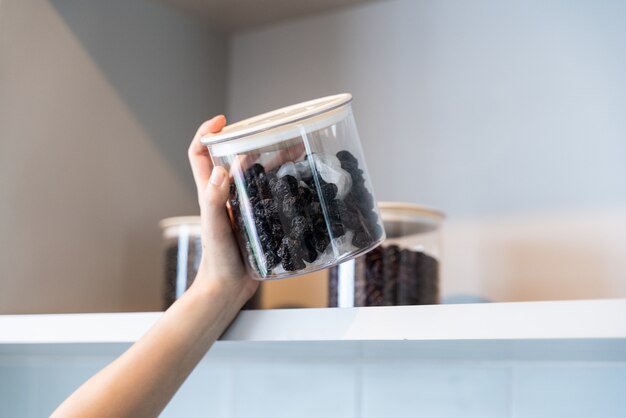How to Store Dates: The Refrigerator and Beyond
Dates are nature’s own little bundles of sweetness, packed with natural sugars, fiber, and vital nutrients. But when it comes to storage, confusion often arises. Can dates be stored in the refrigerator? And if so, how does this impact their flavor, texture, and longevity? Let’s delve into the nuances of storing dates, ensuring you get the most out of these delicious fruits.
Understanding the Basics of Date Storage 🤔
Dates, like many dried fruits, are known for their relatively long shelf life. However, just because they might sit on a shelf in the grocery store doesn't mean they should at home. Several variables can affect the longevity and quality of dates, and understanding these can help make more informed storage choices.
Why Store Dates in the Refrigerator?
Storing dates in the refrigerator can significantly extend their shelf life. While they can last for weeks or even months at room temperature, particularly in cool and dry environments, refrigeration can preserve their quality for up to a year or sometimes more. Cold environments slow down the degradation process, maintaining the fruit's sweetness and chewy texture.
The Effects of Refrigeration on Dates
Refrigeration alters the moisture content to some extent, which can toughen dates over time. However, wrapping them tightly or storing them in an airtight container can protect their natural moisture. A quick room temperature soak or gentle warming can restore their softness when you're ready to enjoy them.
Optimal Storage Techniques for Dates 🍱
Effectively storing dates depends not just on your immediate needs but on their variety and moisture level. Fresh, soft dates and semi-dry varieties each have different storage requirements.
Fresh Dates vs. Dried Dates
Fresh Dates: These are softer, often with higher moisture content. For short-term, room temperature storage can work if they’ll be consumed within a week. For longer-term storage, the refrigerator is your best option.
Dried Dates: Since they have less moisture, dried or semi-dried dates like Deglet Noor or Medjool are more shelf-stable. Keeping them in the refrigerator can still be beneficial to extend their freshness.
Packing for Success
When refrigerating dates, it's crucial to keep them in airtight containers or heavy-duty freezer bags. This prevents them from absorbing odors from other foods and allows for better longevity. Vacuum-sealing is also an excellent method for long-term storage.
Navigating the Shelf: How Long Do Dates Last? 🗓️
Dates have varying shelf lives depending on storage conditions and type. Here’s a general guide on how long they can last:
Room Temperature: Soft, fresh dates can last up to one to two weeks. Semi-dry and dry dates can last between one to two months in a cool and dry place.
Refrigerated: Expect dates to last from 6 to 12 months. It's a go-to for those who purchase in bulk but don't consume rapidly.
Freezing Dates: Yes, dates can be frozen for the ultimate longevity boost, lasting up to several years, although you might notice subtle changes in texture upon thawing.
When to Consider Freezing Dates ❄️
Freezing might be an option if you've purchased dates in bulk or have found an irresistible bargain. Here are some tips for freezing:
- Pre-portioned Freezing: Freeze in small batches to only thaw what you need.
- Maintain Moisture: Wrap dates tightly and place in freezer bags, pushing out as much air as possible.
- Label and Rotate: Always label your packaging with dates for proper food rotation and to keep track.
What to Avoid When Storing Dates
While refrigeration and freezing are excellent for extending the lifespan of dates, improper handling can still lead to waste:
- Avoid Moist Environments: Though dates have relatively low moisture, keeping them in a naturally humid environment without proper packaging can lead to spoilage.
- Direct Sunlight and Heat: These conditions can degrade the quality and speed up spoilage.
Identifying Spoiled Dates 🚫
Knowing how to store dates is only part of the solution; recognizing when they’ve turned can help avoid consuming potentially spoiled fruit.
Discoloration: Dark or blackened spots may indicate spoilage.
Off-Smell: A sour or fermented odor is a clear indicator they should not be consumed.
Mold Growth: Any visible mold should prompt immediate disposal.
Quick Tips for Storing Dates
Here's a concise, visual guide with tips to ensure your dates stay fresh and flavorful:
- ✅ Refrigerate for long-term storage (up to 12 months).
- ✅ Freeze for bulk purchases or long-term storage (years).
- 🗓️ Label with purchase and storage dates.
- 📦 Airtight Containers or vacuum sealing helps prevent odor absorption and moisture loss.
- 🫙 Portion Control: Store in small batches to avoid unnecessary thawing.
Pairing and Preparing Dates 🍽️
Beyond storage, knowing how to best enjoy dates can elevate your culinary experiences. Dates are versatile—great for sweet and savory dishes alike.
Culinary Uses
- Snacking: On their own or stuffed with nuts.
- Baking: As sweeteners in cookies or bread.
- Cooking: Balanced with spices in stews or as a glaze for roasted meats.
- Smoothies/Desserts: Added to smoothies or as a component of vegan puddings and raw energy bars.
Final Thoughts: Making the Most Out of Your Dates
Understanding the best ways to store dates can significantly enhance their longevity and enjoyment. Whether you choose refrigeration, freezing, or room temperature for short-term use, how you store them can affect how they taste and last. By being mindful of your climate, the type of date, and your consumption rate, you can enjoy these sweet treats at their best.
With these insights and practical tips, you can confidently store dates, ensuring they remain a delicious part of your diet. Let's relish the sweetness of dates, knowing they are being stored with care for ultimate flavor preservation. 🍬

